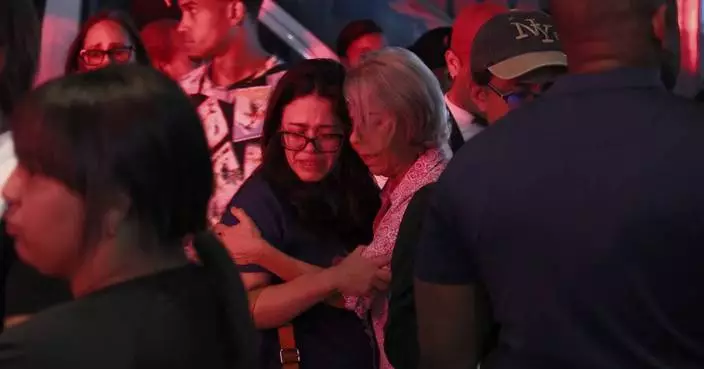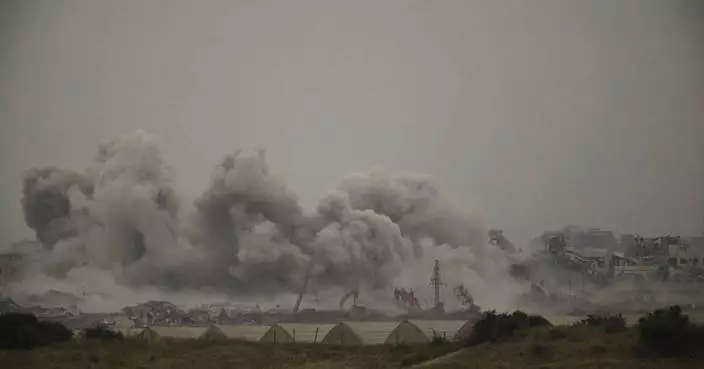DORAL, Fla. (AP) — Wilmer Escaray left Venezuela in 2007 and enrolled at Miami Dade College, opening his first restaurant six years later.
Today he has a dozen businesses that hire Venezuelan migrants like he once was, workers who are now terrified by what could be the end of their legal shield from deportation.
Click to Gallery
Alvaro Duran Stella, 47, a Venezuelan with Temporary Protected Status (TPS) who studied to become a paralegal and now works in Doral, Fla., on immigration application cases for other migrants, walks back to his apartment after working remotely in his community's clubhouse, Saturday, April 5, 2025, in Miramar, Fla. (AP Photo/Rebecca Blackwell)
+13
Gabriela Osuna, right, a 23-year-old Venezuelan immigrant with Temporary Protected Status, or TPS, who co-founded a successful artists collective that produces art events, takes a selfie with her girlfriend Vanessa Sanchez Montero, 29, also originally from Venezuela, at a bar in Doral, Fla., Saturday, April 5, 2025. (AP Photo/Rebecca Blackwell)
U.S. citizens who immigrated from Venezuela between 16 and 30 years ago play dominos outside El Arepazo, a restaurant that is a hub of the largest Venezuelan community in the U.S., in Doral, Fla., Wednesday, April 2, 2025. Many of the friends, including Cesar Mena, at right, voted for President Donald Trump and continue to support him. "I have family and friends on TPS [Temporary Protected Status] and I feel bad for them. But it's a temporary situation, and you need to resolve the problem." (AP Photo/Rebecca Blackwell)
A woman and child walk down a commercial street, in Doral, Fla., Saturday, April 5, 2025. (AP Photo/Rebecca Blackwell)
Yrene Bruno works inside her franchise of "Sabor Venezolano," selling Venezuelan food and treats, in Doral, Fla., Tuesday, April 1, 2025. (AP Photo/Rebecca Blackwell)
People walk along a street lined with restaurants and businesses in Doral, Fla., Saturday, April 5, 2025. (AP Photo/Rebecca Blackwell)
Residential neighborhoods are seen in Doral, Fla., Saturday, April 5, 2025. (AP Photo/Rebecca Blackwell)
Alvaro Duran Stella, 47, a Venezuelan with Temporary Protected Status (TPS) who studied to become a paralegal and now works in Doral, Fla., on immigration application cases for other migrants, walks back to his apartment after working remotely in his community's clubhouse, Saturday, April 5, 2025, in Miramar, Fla. (AP Photo/Rebecca Blackwell)
Venezuelan stickers and specialty products are sold alongside more typical offerings in a gas station shop in Doral, Fla., Tuesday, April 1, 2025. (AP Photo/Rebecca Blackwell)
People walk down a commercial street in Doral, Fla., Friday, April 4, 2025. (AP Photo/Rebecca Blackwell)
People shop in the Sabores Market, specializing in Venezuelan food and goods, Tuesday, April 1, 2025, in Doral, Fla. (AP Photo/Rebecca Blackwell)
Reinaldo Schanz, a 19-year-old U.S. citizen who emmigrated from Venezuela at age 2, practices moves on his rollerblades after finishing work as a park service aide in Doral Central Park, Wednesday, April 2, 2025, in Doral, Fla. Schanz said his family supports the administration going after migrants with criminal records, but was surprised to see people on Temporary Protected Status (TPS) and similar programs targeted as well. (AP Photo/Rebecca Blackwell)
People wear virtual reality headsets as they immerse themselves in "Teleport to Venezuela," a 35-minute VR documentary by Noa Iimura exploring life in Venezuela, as the film's national and European tour kicks off in the largest Venezuelan community in the U.S., in Doral, Fla., Saturday, April 5, 2025. (AP Photo/Rebecca Blackwell)
A 9-year-old girl with Temporary Protected Status, or TPS, who was born in Venezuela, but who fluently speaks only English and is in the gifted program at her school, watches TV in her family's apartment, Saturday, April 5, 2025, in Doral, Fla. (AP Photo/Rebecca Blackwell)
A 9-year-old girl with Temporary Protected Status, or TPS, who was born in Venezuela, but who fluently speaks only English and is in the gifted program at her school, watches TV in her family's apartment, Saturday, April 5, 2025, in Doral, Fla. (AP Photo/Rebecca Blackwell)
Maria, a Venezuelan immigrant who lives with her U.S. citizen husband and two daughters who have Temporary Protected Status, or TPS, vacuums a rug as the family organizes and packs for their upcoming move into a larger and nicer apartment, Saturday, April 5, 2025, in Doral, Fla. (AP Photo/Rebecca Blackwell)
Gabriela Osuna, right, a 23-year-old Venezuelan immigrant with Temporary Protected Status, or TPS, who co-founded a successful artists collective that produces art events, takes a selfie with her girlfriend Vanessa Sanchez Montero, 29, also originally from Venezuela, at a bar in Doral, Fla., Saturday, April 5, 2025. (AP Photo/Rebecca Blackwell)
Cars pass through the area known as Downtown Doral, Saturday, April 5, 2025, in Doral, Fla. (AP Photo/Rebecca Blackwell)
Patrons eat inside one of the locations of Sabor Venezolano owned by Wilmer Escaray, who operates a dozen businesses that hire Venezuelan migrants like he once was, in Doral, Fla., Tuesday, April 1, 2025. (AP Photo/Rebecca Blackwell)
U.S. citizens who immigrated from Venezuela between 16 and 30 years ago play dominos outside El Arepazo, a restaurant that is a hub of the largest Venezuelan community in the U.S., in Doral, Fla., Wednesday, April 2, 2025. Many of the friends, including Cesar Mena, at right, voted for President Donald Trump and continue to support him. "I have family and friends on TPS [Temporary Protected Status] and I feel bad for them. But it's a temporary situation, and you need to resolve the problem." (AP Photo/Rebecca Blackwell)
Since the start of February the Trump administration has ended two federal programs that together allowed more 700,000 Venezuelans to live and work legally in the U.S. along with hundreds of thousands of Cubans, Haitians and Nicaraguans.
In the largest Venezuelan community in the United States, people dread what could face them if lawsuits that aim to stop the government fail. It's all anyone discusses in “Little Venezuela” or “Doralzuela,” a city of 80,000 people surrounded by Miami sprawl, freeways and the Florida Everglades.
People who lose their protections would have to remain illegally at the risk of being deported or return home, an unlikely route given the political and economic turmoil in Venezuela.
“It’s really quite unfortunate to lose that human capital because there are people who do work here that other people won’t do,” Escaray, 37, said at one of his “Sabor Venezolano” restaurants.
Spanish is more common than English in shopping centers along Doral's wide avenues, and Venezuelans feel like they're back home but with more security and comfort.
A sweet scent wafts from round, flat cornmeal arepas sold at many establishments. Stores at gas stations sell flour and white cheese used to make arepas and T-shirts and hats with the yellow, blue and red stripes of the Venezuelan flag.
John came from Venezuela nine years ago and bought a growing construction company with a partner. He and his wife are on Temporary Protected Status, or TPS, which Congress created in 1990 for people in the United States whose homelands are considered unsafe to return due to natural disaster or civil strife. Beneficiaries can live and work while it lasts but TPS carries no path to citizenship.
Born in the U.S., their 5-year-old daughter is a citizen. John, 37, asked to be identified by first name only for fear of being deported.
His wife helps with administration at their construction business while working as a real-estate broker. The couple told their daughter that they may have to leave the United States. Venezuela is not an option.
“It hurts us that the government is turning its back on us,” John said. “We aren’t people who came to commit crimes; we came to work, to build.”
A federal judge ordered on March 31 that temporary protected statuswould stand until a legal challenge's next stage in court and at least 350,000 Venezuelans were temporarily spared becoming illegal. Escaray, the owner of the restaurants, said nearly all of his 150 employees are Venezuelan and more than 100 are on TPS.
The federal immigration program that allowed more than 500,000 Cubans, Venezuelans, Haitians and Nicaraguans to work and live legally in the U.S. — humanitarian parole — expires April 24 absent court intervention.
Venezuelans were one of the main beneficiaries when former President Joe Biden sharply expanded TPS and other temporary protections. Trump tried to end them in his first term and now his second.
The end of the temporary protections has generated little political reaction among Republicans except for three Cuban-American representatives from Florida who called for avoiding the deportations of affected Venezuelans. Mario Díaz Balart, Carlos Gimenez and Maria Elvira Salazar have urged the government to spare Venezuelans without criminal records from deportation and review TPS beneficiaries on a case-by-case basis.
The mayor of Doral, home to a Trump golf club since 2012, wrote a letter to the president asking him to find a legal pathway for Venezuelans who haven’t committed crimes.
“These families do not want handouts,” said Christi Fraga, a daughter of Cuban exiles. “They want an opportunity to continue working, building, and investing in the United States.”
About 8 million people have fled Venezuela since 2014, settling first in neighboring countries in Latin America and the Caribbean. After the COVID-19 pandemic, they increasingly set their sights on the United States, walking through the notorious jungle in Colombia and Panama or flying to the United States on humanitarian parole with a financial sponsor.
In Doral, upper-middle-class professionals and entrepreneurs came to invest in property and businesses when socialist Hugo Chávez won the presidency in the late 1990s. They were followed by political opponents and entrepreneurs who set up small businesses. In recent years, more lower-income Venezuelans have come for work in service industries.
They are doctors, lawyers, beauticians, construction workers and house cleaners. Some are naturalized U.S. citizens or live in the country illegally with U.S.-born children. Others overstay tourist visas, seek asylum or have some form of temporary status.
Thousands went to Doral as Miami International Airport facilitated decades of growth.
Frank Carreño, president of the Venezuelan American Chamber of Commerce and a Doral resident for 18 years, said there is an air of uncertainty.
“What is going to happen? People don't want to return or can't return to Venezuela,” he said.
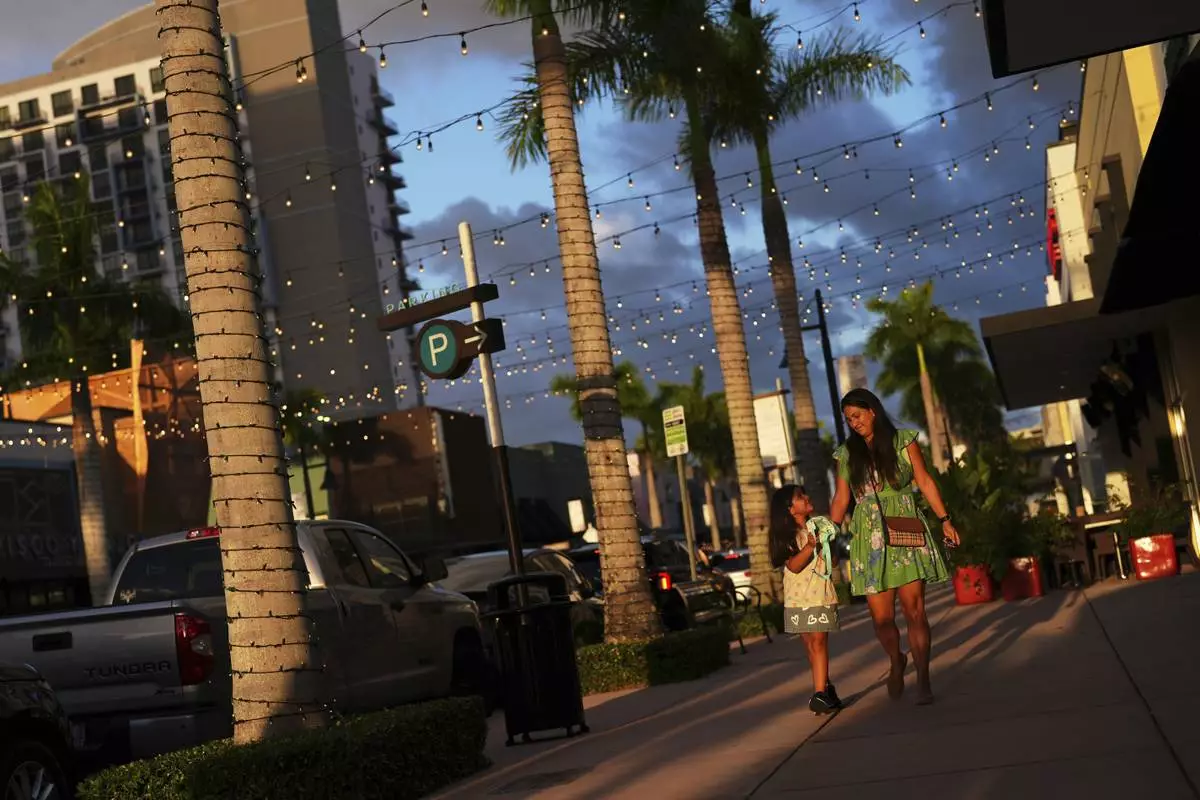
A woman and child walk down a commercial street, in Doral, Fla., Saturday, April 5, 2025. (AP Photo/Rebecca Blackwell)
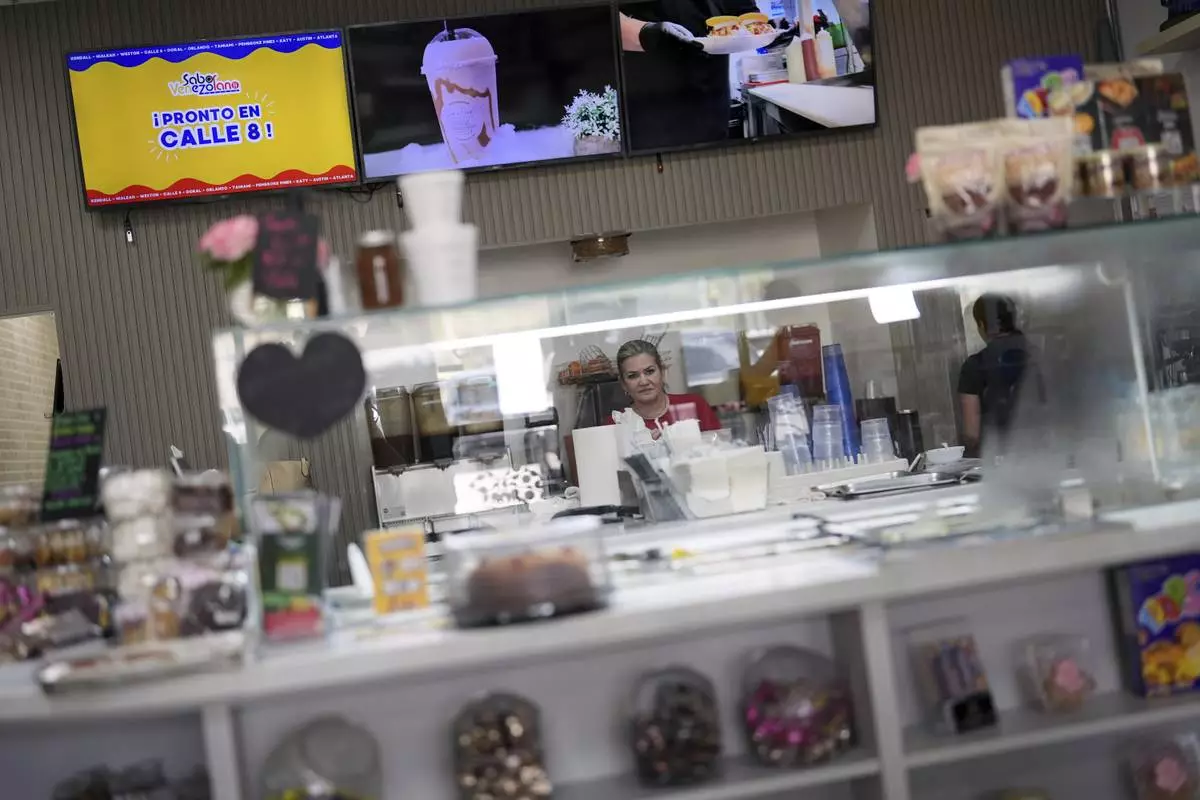
Yrene Bruno works inside her franchise of "Sabor Venezolano," selling Venezuelan food and treats, in Doral, Fla., Tuesday, April 1, 2025. (AP Photo/Rebecca Blackwell)
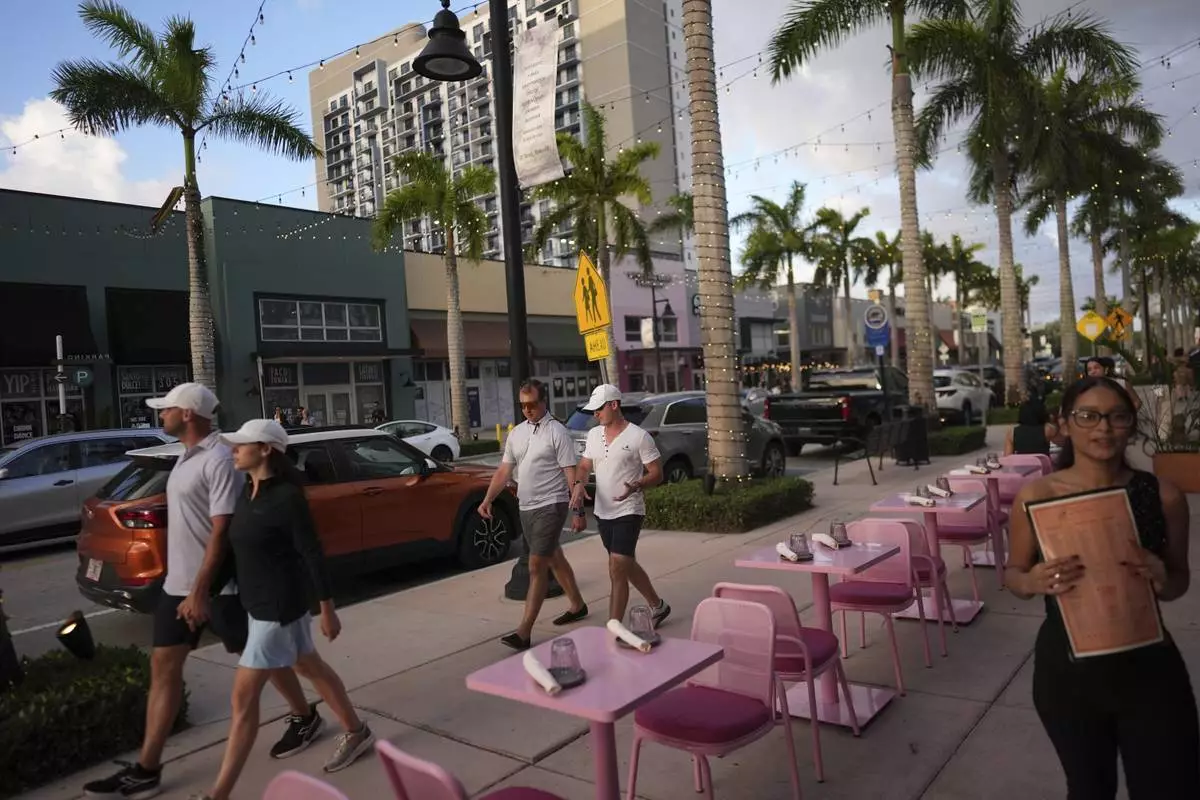
People walk along a street lined with restaurants and businesses in Doral, Fla., Saturday, April 5, 2025. (AP Photo/Rebecca Blackwell)
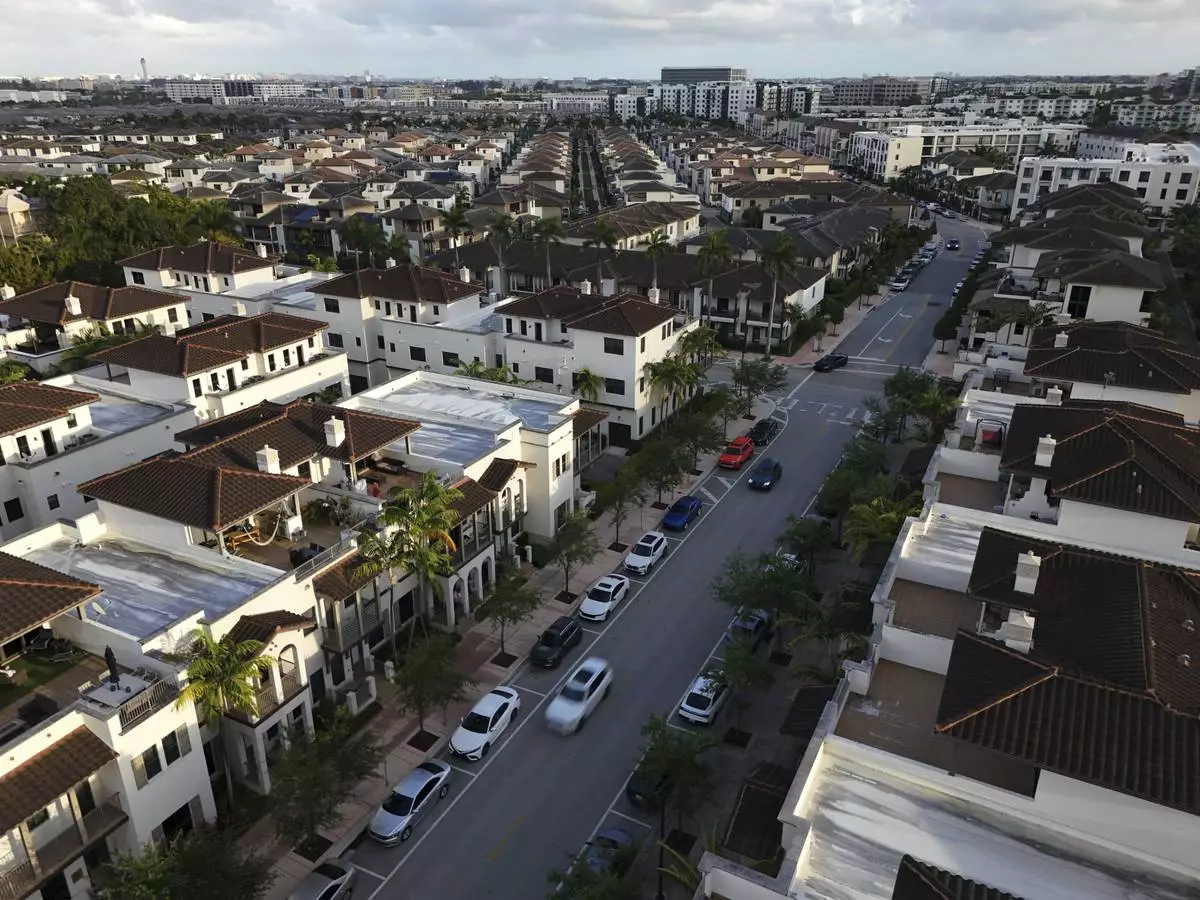
Residential neighborhoods are seen in Doral, Fla., Saturday, April 5, 2025. (AP Photo/Rebecca Blackwell)
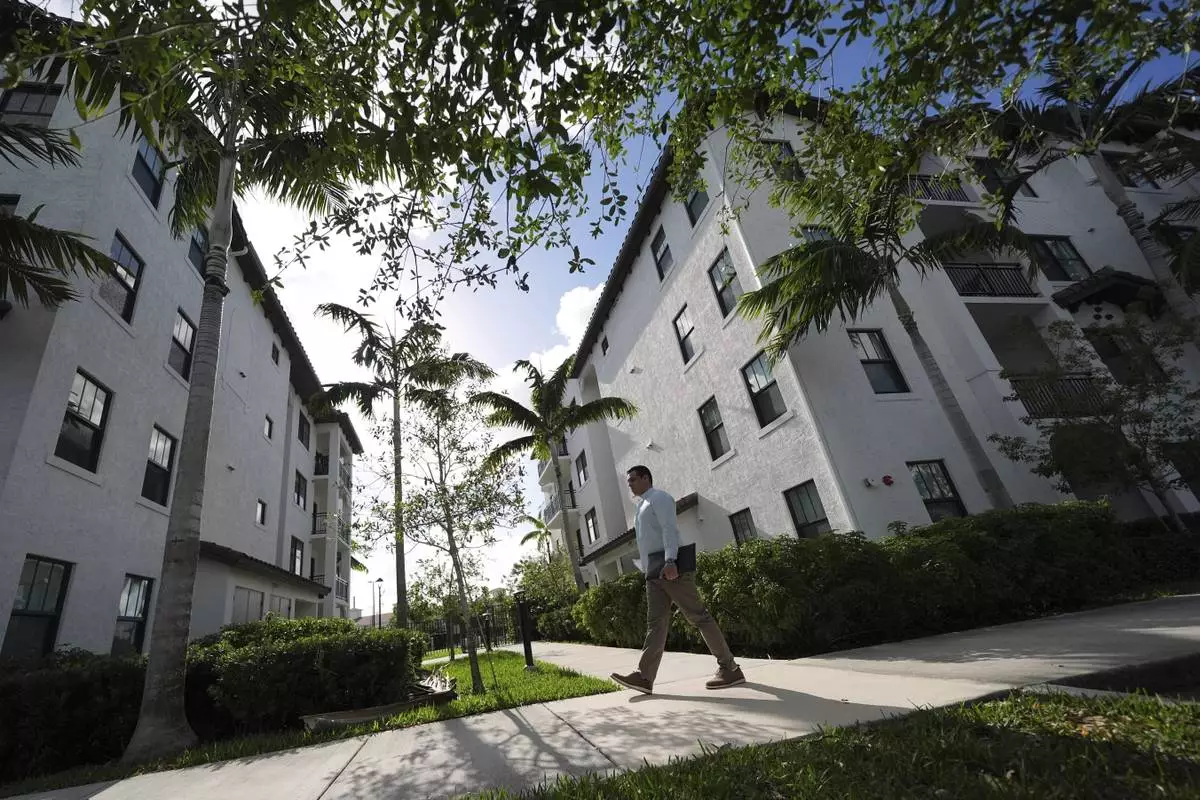
Alvaro Duran Stella, 47, a Venezuelan with Temporary Protected Status (TPS) who studied to become a paralegal and now works in Doral, Fla., on immigration application cases for other migrants, walks back to his apartment after working remotely in his community's clubhouse, Saturday, April 5, 2025, in Miramar, Fla. (AP Photo/Rebecca Blackwell)
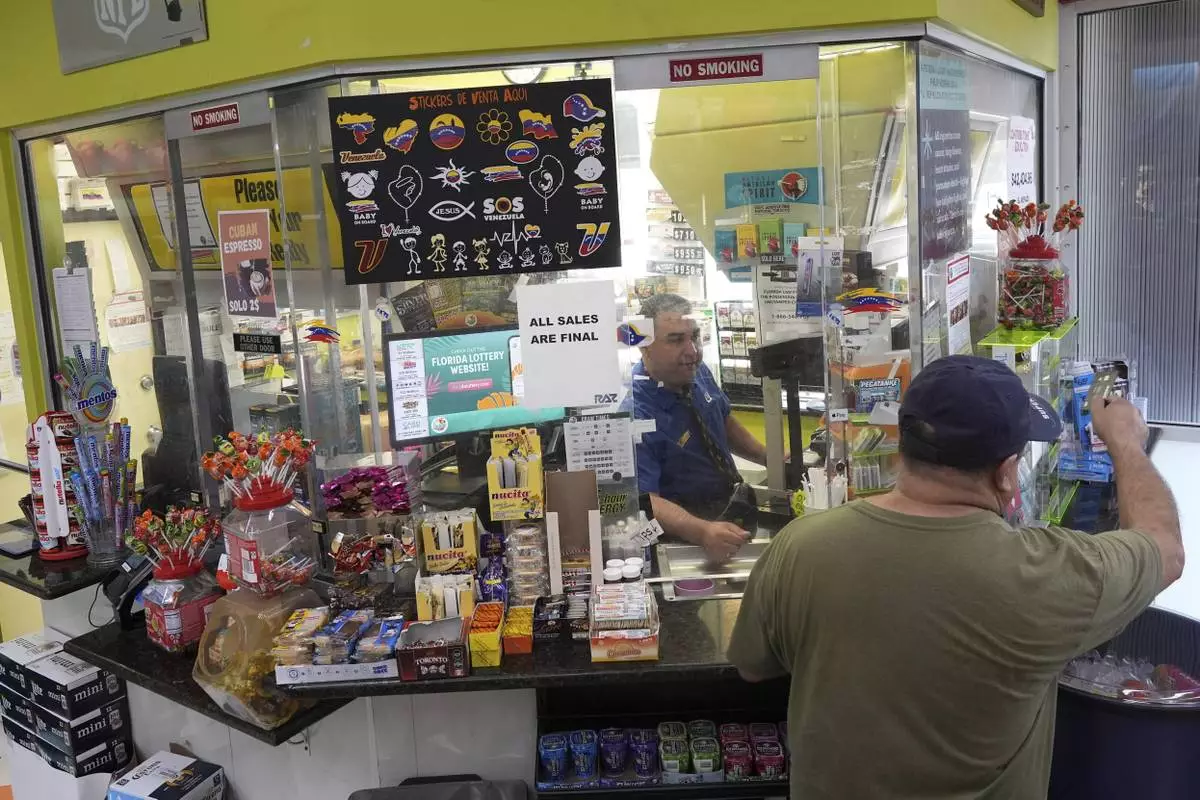
Venezuelan stickers and specialty products are sold alongside more typical offerings in a gas station shop in Doral, Fla., Tuesday, April 1, 2025. (AP Photo/Rebecca Blackwell)
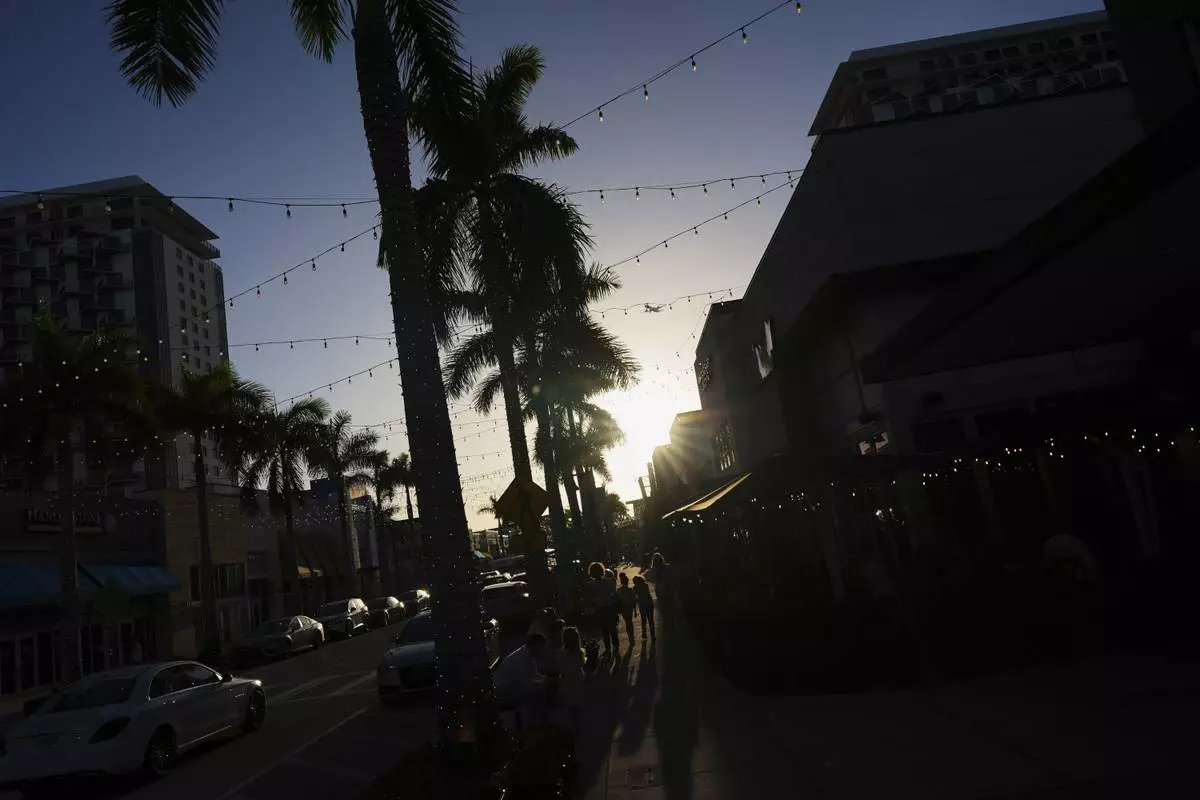
People walk down a commercial street in Doral, Fla., Friday, April 4, 2025. (AP Photo/Rebecca Blackwell)
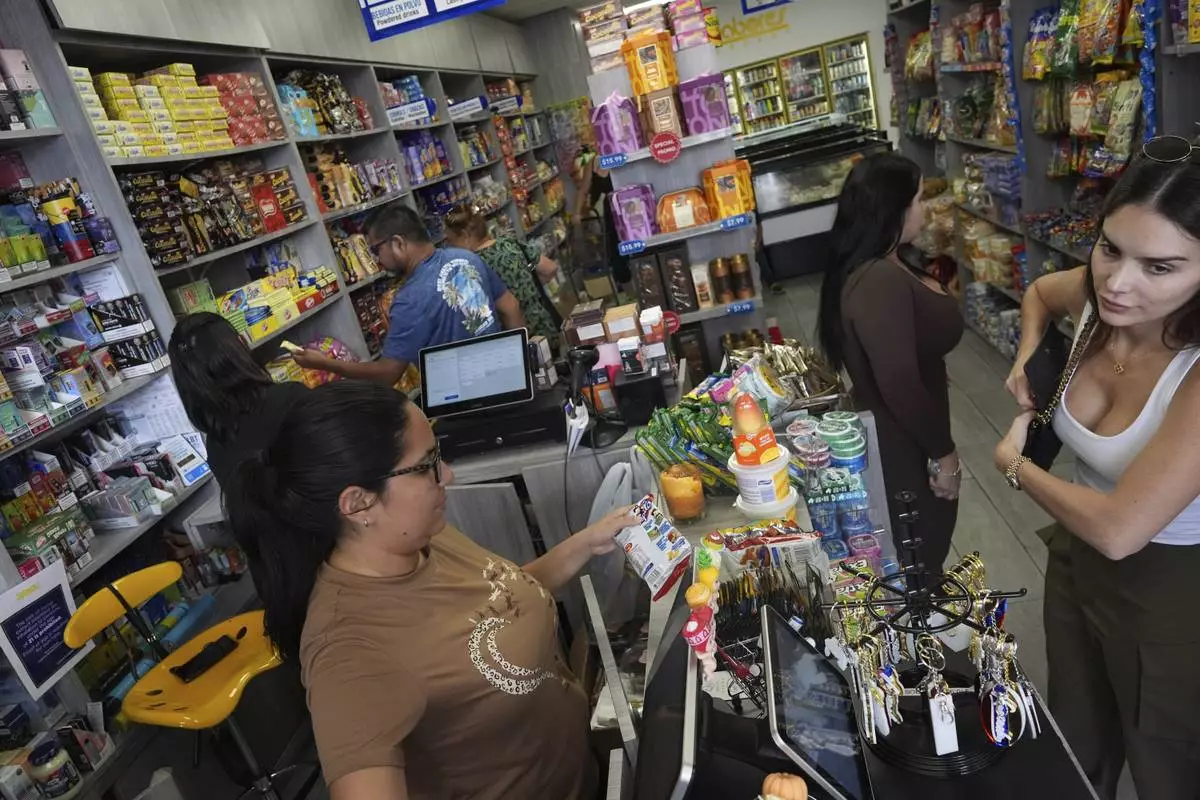
People shop in the Sabores Market, specializing in Venezuelan food and goods, Tuesday, April 1, 2025, in Doral, Fla. (AP Photo/Rebecca Blackwell)
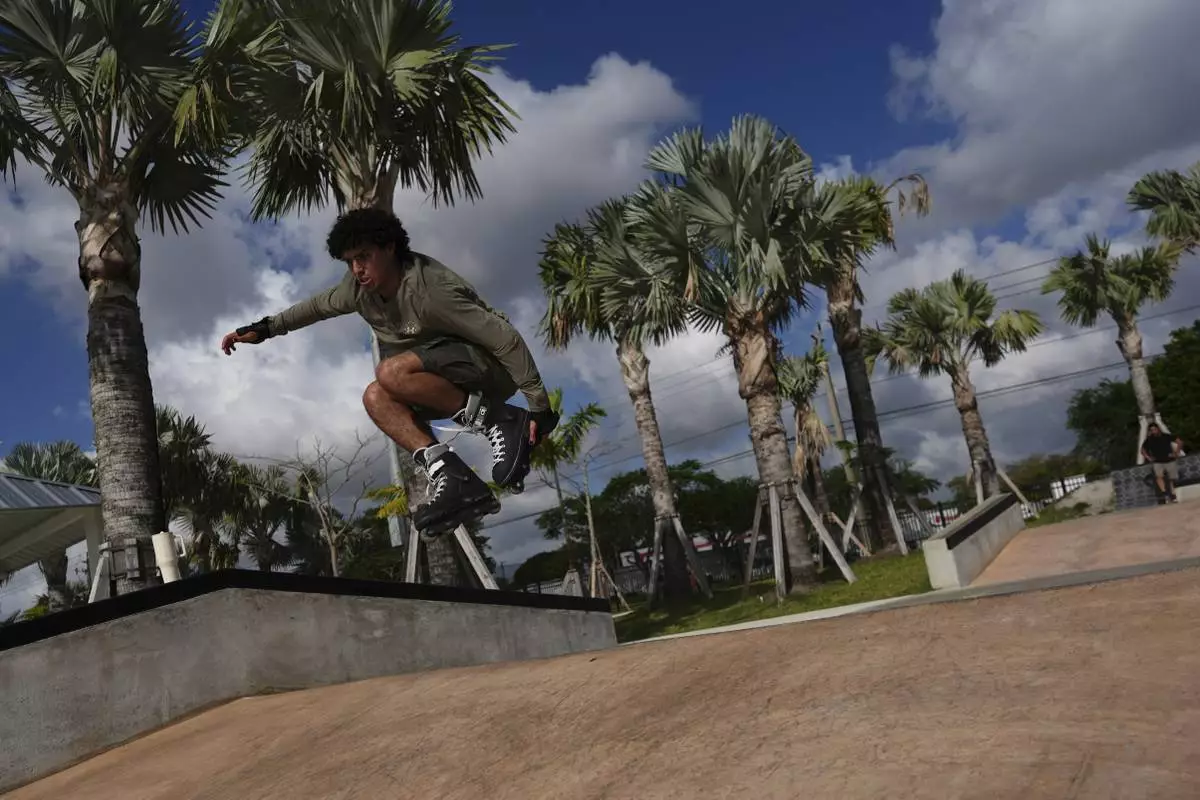
Reinaldo Schanz, a 19-year-old U.S. citizen who emmigrated from Venezuela at age 2, practices moves on his rollerblades after finishing work as a park service aide in Doral Central Park, Wednesday, April 2, 2025, in Doral, Fla. Schanz said his family supports the administration going after migrants with criminal records, but was surprised to see people on Temporary Protected Status (TPS) and similar programs targeted as well. (AP Photo/Rebecca Blackwell)
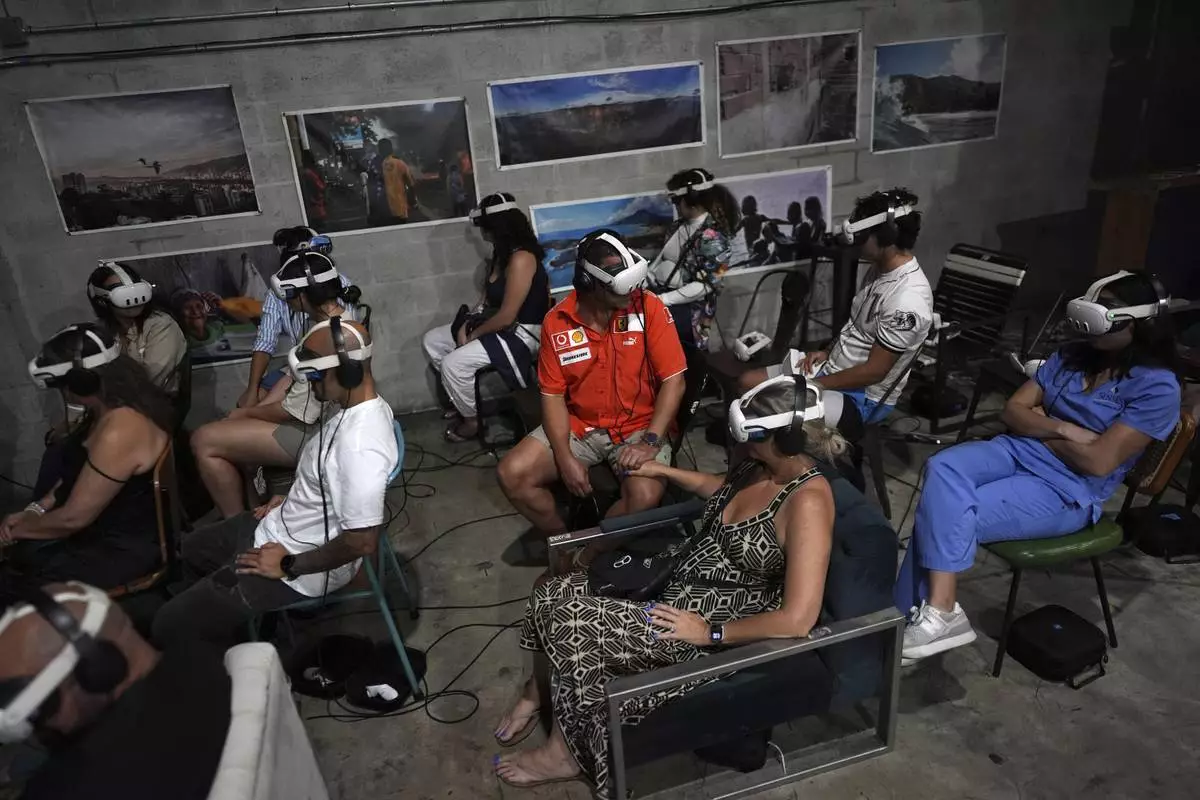
People wear virtual reality headsets as they immerse themselves in "Teleport to Venezuela," a 35-minute VR documentary by Noa Iimura exploring life in Venezuela, as the film's national and European tour kicks off in the largest Venezuelan community in the U.S., in Doral, Fla., Saturday, April 5, 2025. (AP Photo/Rebecca Blackwell)
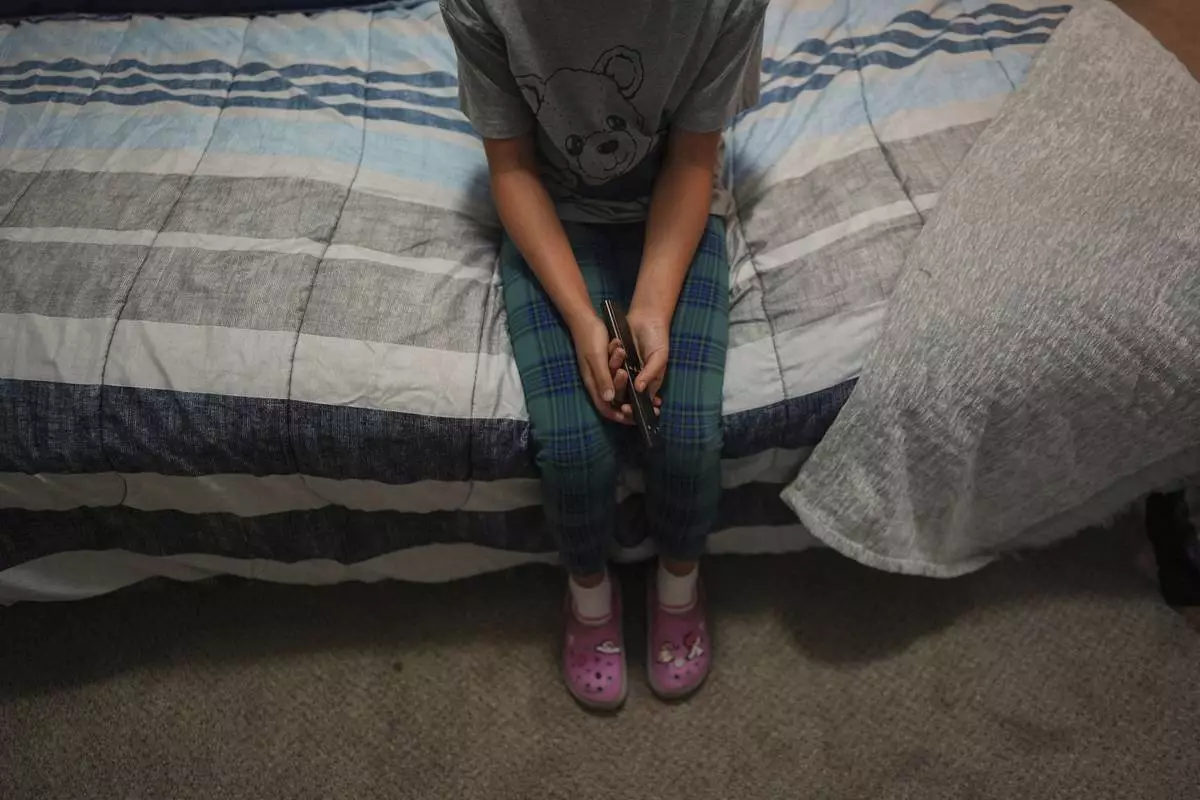
A 9-year-old girl with Temporary Protected Status, or TPS, who was born in Venezuela, but who fluently speaks only English and is in the gifted program at her school, watches TV in her family's apartment, Saturday, April 5, 2025, in Doral, Fla. (AP Photo/Rebecca Blackwell)
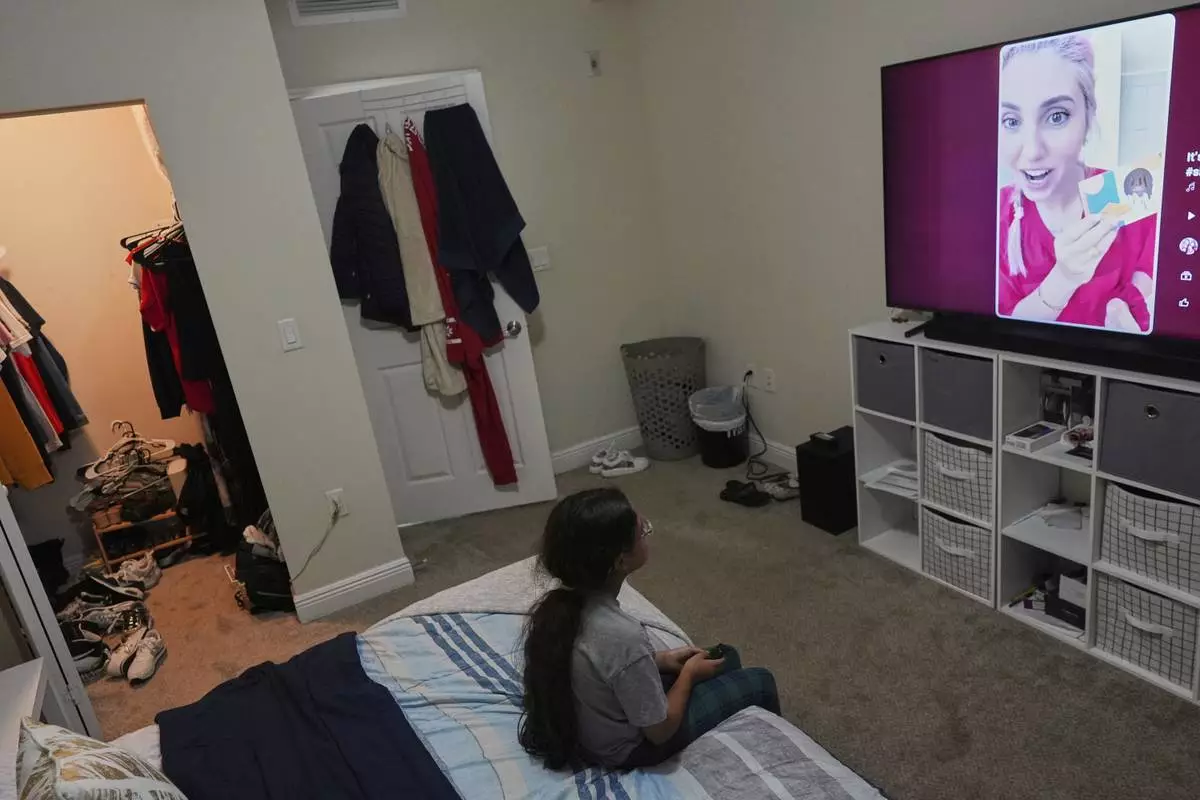
A 9-year-old girl with Temporary Protected Status, or TPS, who was born in Venezuela, but who fluently speaks only English and is in the gifted program at her school, watches TV in her family's apartment, Saturday, April 5, 2025, in Doral, Fla. (AP Photo/Rebecca Blackwell)

Maria, a Venezuelan immigrant who lives with her U.S. citizen husband and two daughters who have Temporary Protected Status, or TPS, vacuums a rug as the family organizes and packs for their upcoming move into a larger and nicer apartment, Saturday, April 5, 2025, in Doral, Fla. (AP Photo/Rebecca Blackwell)
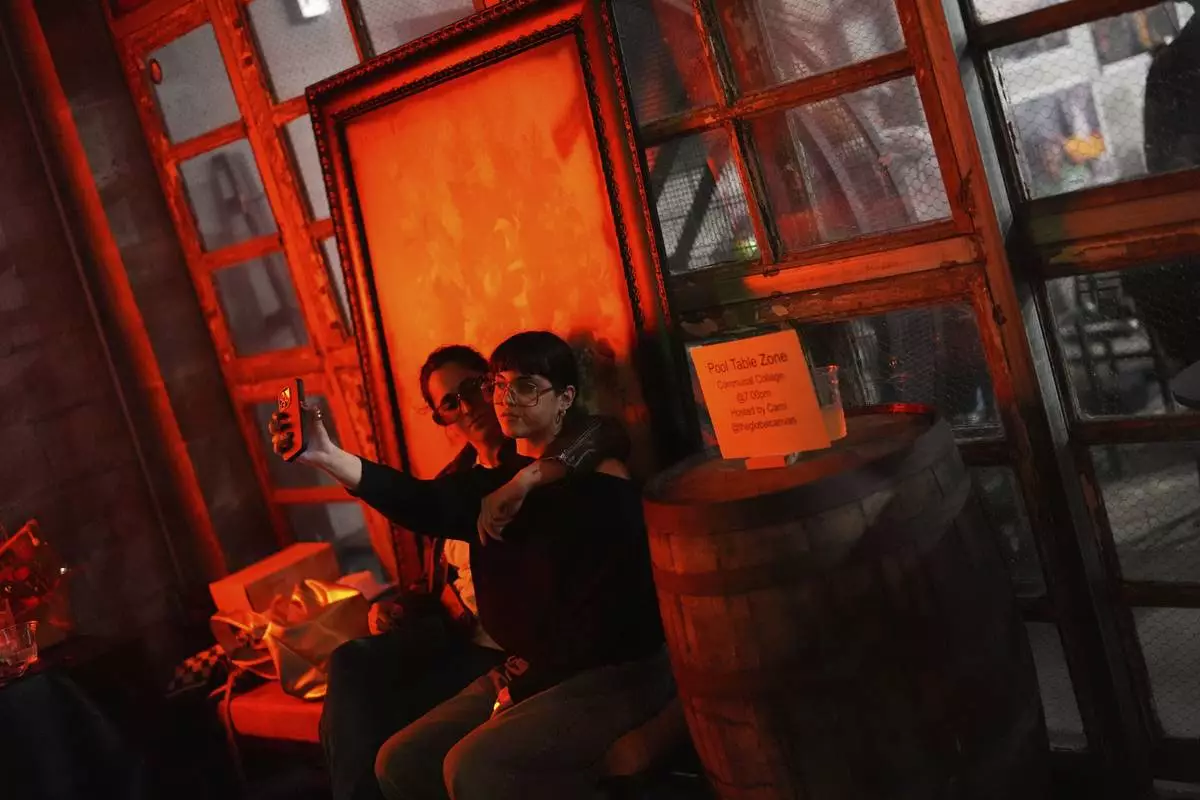
Gabriela Osuna, right, a 23-year-old Venezuelan immigrant with Temporary Protected Status, or TPS, who co-founded a successful artists collective that produces art events, takes a selfie with her girlfriend Vanessa Sanchez Montero, 29, also originally from Venezuela, at a bar in Doral, Fla., Saturday, April 5, 2025. (AP Photo/Rebecca Blackwell)
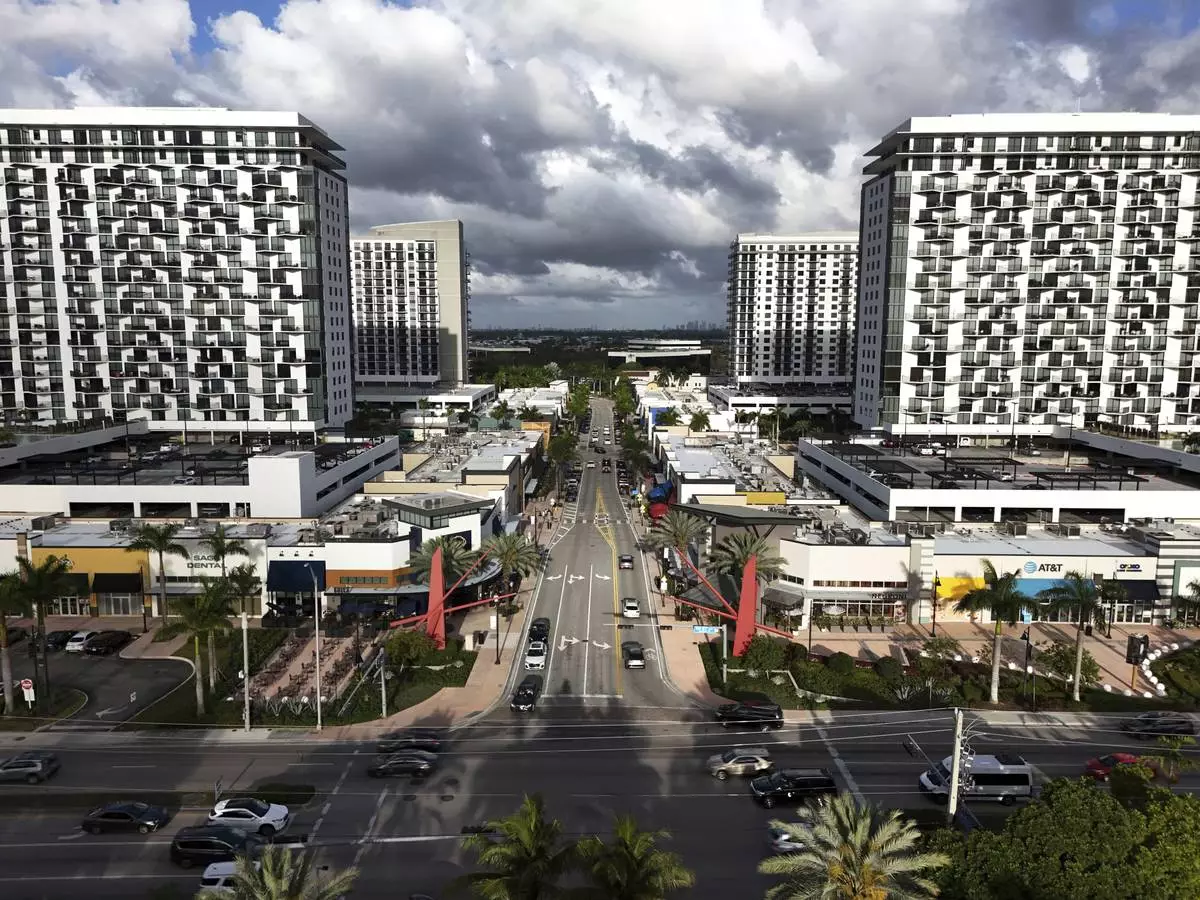
Cars pass through the area known as Downtown Doral, Saturday, April 5, 2025, in Doral, Fla. (AP Photo/Rebecca Blackwell)
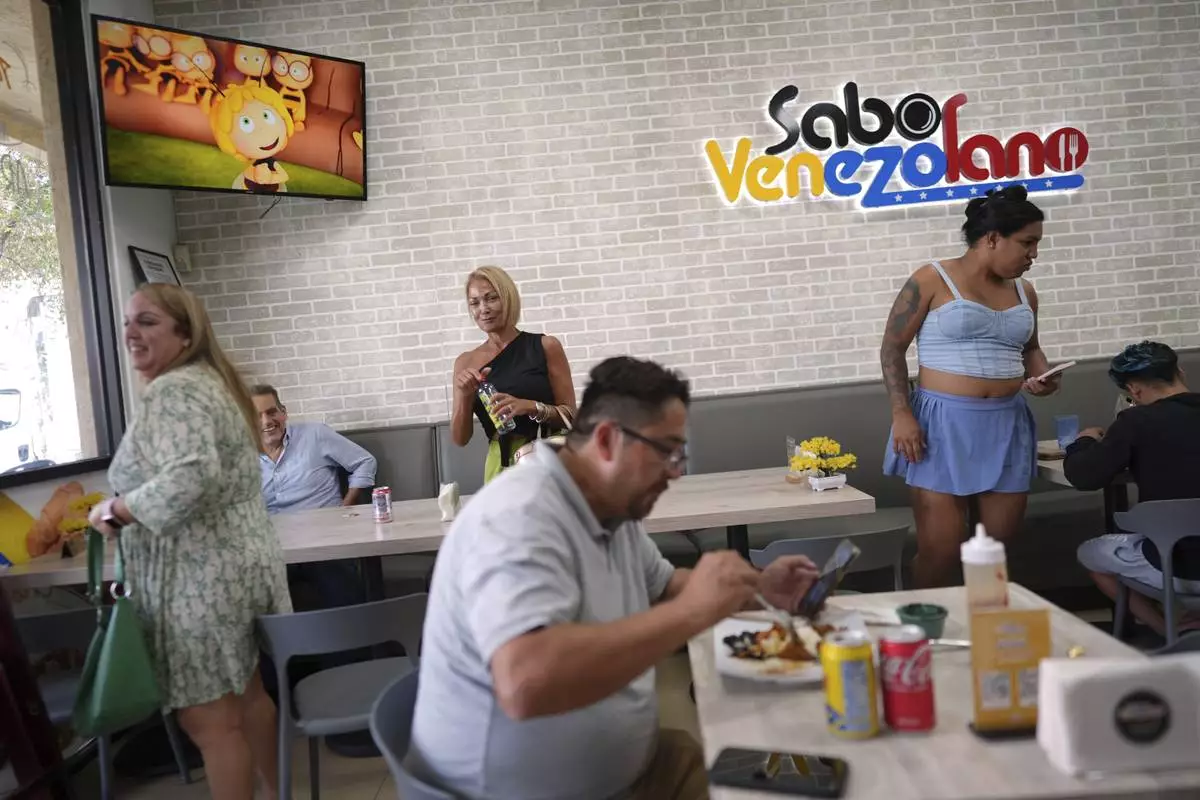
Patrons eat inside one of the locations of Sabor Venezolano owned by Wilmer Escaray, who operates a dozen businesses that hire Venezuelan migrants like he once was, in Doral, Fla., Tuesday, April 1, 2025. (AP Photo/Rebecca Blackwell)
![U.S. citizens who immigrated from Venezuela between 16 and 30 years ago play dominos outside El Arepazo, a restaurant that is a hub of the largest Venezuelan community in the U.S., in Doral, Fla., Wednesday, April 2, 2025. Many of the friends, including Cesar Mena, at right, voted for President Donald Trump and continue to support him. "I have family and friends on TPS [Temporary Protected Status] and I feel bad for them. But it's a temporary situation, and you need to resolve the problem." (AP Photo/Rebecca Blackwell)](https://image.bastillepost.com/1200x/wp-content/uploads/global/2025/04/c69423facf44b6b804e1e5ae7a5cc99f_Immigration_Temporary_Status_Venezuelans_79573.jpg.webp)
U.S. citizens who immigrated from Venezuela between 16 and 30 years ago play dominos outside El Arepazo, a restaurant that is a hub of the largest Venezuelan community in the U.S., in Doral, Fla., Wednesday, April 2, 2025. Many of the friends, including Cesar Mena, at right, voted for President Donald Trump and continue to support him. "I have family and friends on TPS [Temporary Protected Status] and I feel bad for them. But it's a temporary situation, and you need to resolve the problem." (AP Photo/Rebecca Blackwell)
TOKYO (AP) — Asian shares surged in Thursday trading, with Japan’s benchmark jumping more than 2,000 points almost immediately after the Tokyo exchange opened, as investors welcomed President Donald Trump ’s decision to back off on most of his tariffs.
Analysts had expected the regional comeback given that U.S. stocks had one of their best days in history Wednesday on a euphoric Wall Street, where investor hopes had run high that Trump would tone down the tariffs.
On Thursday, Japan’s benchmark Nikkei 225 jumped 8.2% in morning trading to 34,302.05, zooming upward as soon as trading began. Australia’s S&P/ASX 200 soared 4.7% to 7,721.40. South Korea’s Kospi gained 4.9% to 7,721.40. Hong Kong's Hang Seng added 2.8% to 20,821.48. The Shanghai Composite edged up 0.6% to 3,207.35.
Stephen Innes, managing partner at SPI Asset Management, called the reaction “from fear to euphoria.”
“It’s now a manageable risk, especially as global recession tail bets get unwound, and most of Asia’s exporters breathe a massive sigh of relief,” he said, referring to the tariffs on China, which Trump has kept.
On Wall Street, the S&P 500 surged 9.5%, an amount that would count as a good year for the market. It had been sinking earlier in the day on worries that Trump’s trade war could drag the global economy into a recession. But then came the posting on social media that investors worldwide had been waiting and wishing for.
“I have authorized a 90 day PAUSE,” Trump said, after recognizing the more than 75 countries that he said have been negotiating on trade and had not retaliated against his latest increases in tariffs.
Treasury Secretary Scott Bessent later told reporters that Trump was pausing his so-called ‘reciprocal’ tariffs on most of the country’s biggest trading partners, but maintaining his 10% tariff on nearly all global imports.
China was a huge exception, though, with Trump saying tariffs are going up to 125% against its products. That raises the possibility of more swings ahead that could stun financial markets. The trade war is not over, and an escalating battle between the world’s two largest economies can create plenty of damage. U.S. stocks are also still below where they were just a week ago, when Trump announced worldwide tariffs on what he called “Liberation Day.”
But on Wednesday, at least, the focus on Wall Street was on the positive. The Dow Jones Industrial Average shot to a gain of 2,962 points, or 7.9%. The Nasdaq composite leaped 12.2%. The S&P 500 had its third-best day since 1940.
The relief came after doubts had crept in about whether Trump cared about the financial pain the U.S. stock market was taking because of his tariffs. The S&P 500, the index that sits at the center of many 401(k) accounts, came into the day nearly 19% below its record set less than two months ago.
That surprised many professional investors who had long thought that a president who used to crow about records for the Dow under his watch would pull back on policies if they sent markets reeling.
Wednesday’s rally pulled the S&P 500 index away from the edge of what’s called a “bear market.” That’s what professionals call it when a run-of-the-mill drop of 10% for U.S. stocks, which happens every year or so, graduates into a more vicious fall of 20%. The index is now down 11.2% from its record.
Wall Street also got a boost from a relatively smooth auction of U.S. Treasurys in the bond market Wednesday. Earlier jumps in Treasury yields had rattled the market, indicating increasing levels of stress. Trump himself said Wednesday that he had been watching the bond market “getting a little queasy.”
Analysts say several reasons could be behind the rise in yields, including hedge funds and other investors having to sell their Treasury bonds to raise cash in order to make up for losses in the stock market. Investors outside the United States may also be selling their U.S. Treasurys because of the trade war. Such actions would push down prices for Treasurys, which in turn would push up their yields.
Regardless of the reasons behind it, higher yields on Treasurys add pressure on the stock market and push upward on rates for mortgages and other loans for U.S. households and businesses.
The moves are particularly notable because U.S. Treasury yields have historically dropped — not risen — during scary times for the market because the bonds are usually seen as some of the safest possible investments. This week’s sharp rise had brought the yield on the 10-year Treasury back to where it was in late February.
After approaching 4.50% in the morning, the 10-year yield pulled back to 4.34% following Trump’s pause and the Treasury’s auction. That’s still up from 4.26% late Tuesday and from just 4.01% at the end of last week.
In energy trading, benchmark U.S. crude fell 56 cents to $61.79 a barrel. Brent crude, the international standard, declined 74 cents to $64.74 a barrel.
In currency trading, the U.S. dollar fell to 146.83 Japanese yen from 147.38 yen. The euro cost $1.0980, up from $1.0954.
AP Business Writer Stan Choe contributed.
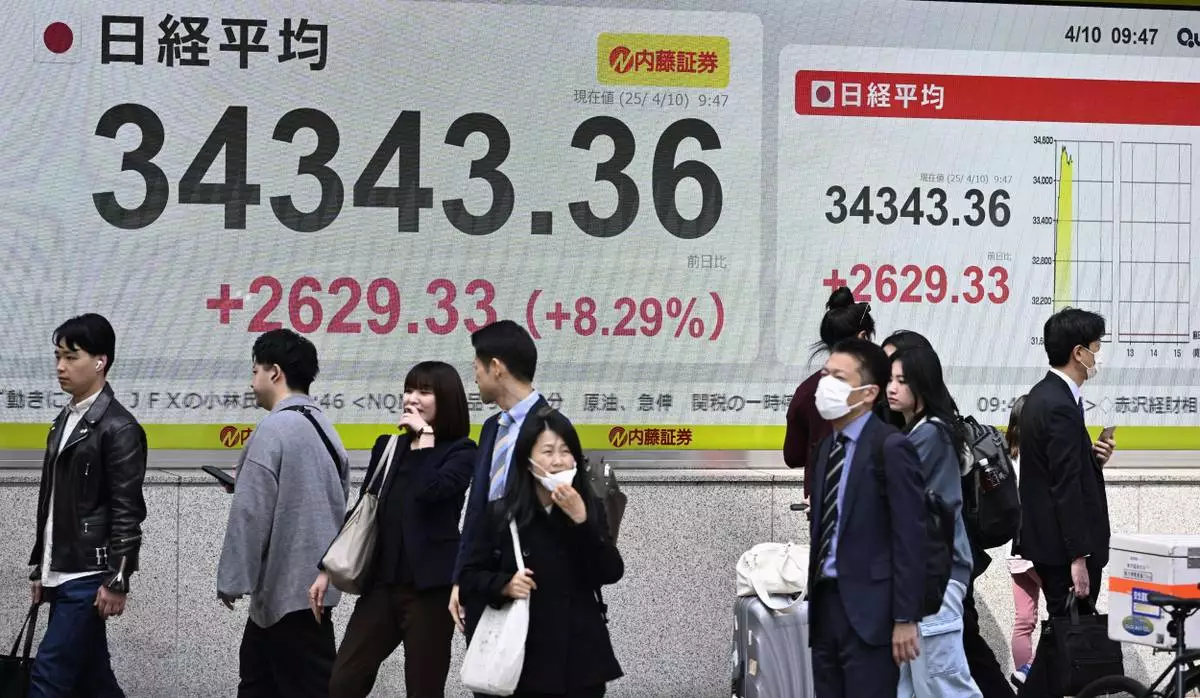
People walk by an electronic board showing Japan's Nikkei 225 index at a securities firm in Tokyo Thursday, April 10, 2025. (Kyodo News via AP)
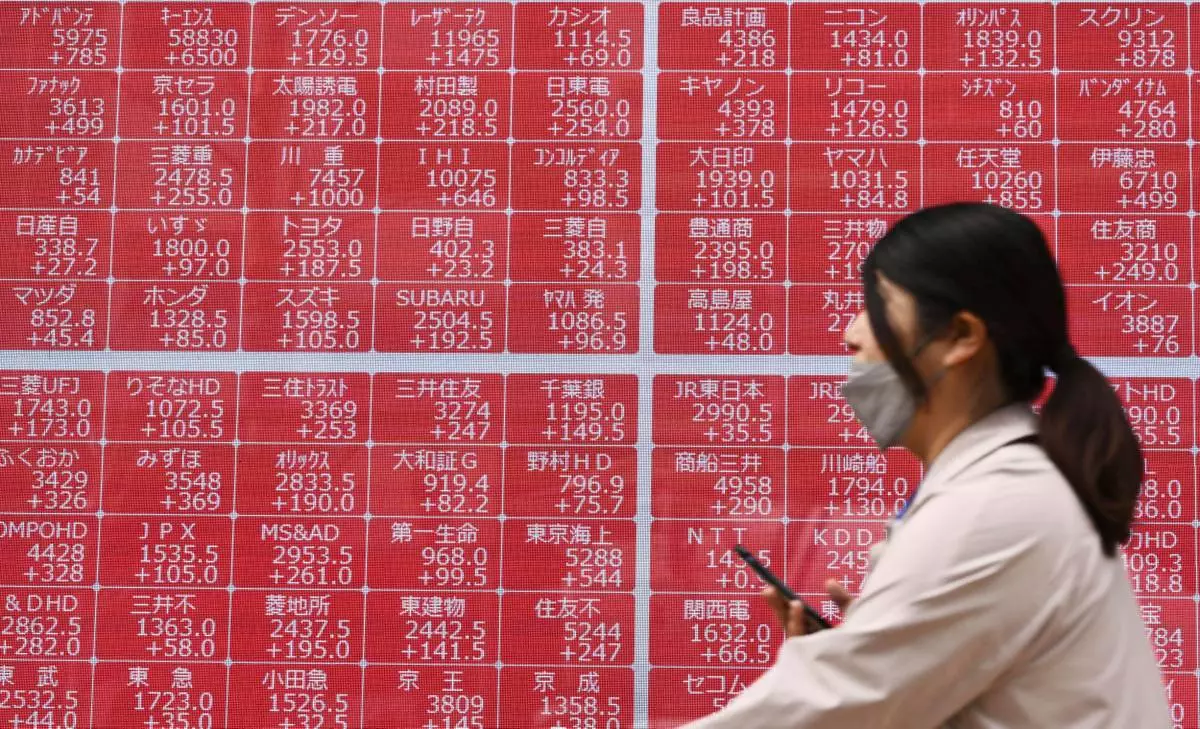
A person walks past an electronic stock board at a securities firm in Tokyo Thursday, April 10, 2025. (Kyodo News via AP)

A currency trader walks by the screens showing the Korea Composite Stock Price Index (KOSPI), left, and the foreign exchange rate between U.S. dollar and South Korean won at a foreign exchange dealing room in Seoul, South Korea, Thursday, April 10, 2025. (AP Photo/Lee Jin-man)

A currency trader watches computer monitors at a foreign exchange dealing room in Seoul, South Korea, Thursday, April 10, 2025. (AP Photo/Lee Jin-man)

A currency trader walks by the screens showing the Korea Composite Stock Price Index (KOSPI), left, the foreign exchange rate between U.S. dollar and South Korean won and the Korean Securities Dealers Automated Quotations (KOSDAQ) at a foreign exchange dealing room in Seoul, South Korea, Thursday, April 10, 2025. (AP Photo/Lee Jin-man)

A currency trader prepares to work near the screens showing the Korea Composite Stock Price Index (KOSPI) and the foreign exchange rate between U.S. dollar and South Korean won at a foreign exchange dealing room in Seoul, South Korea, Thursday, April 10, 2025. (AP Photo/Lee Jin-man)

A currency trader watches computer monitors near the screen showing the foreign exchange rate between U.S. dollar and South Korean won at a foreign exchange dealing room in Seoul, South Korea, Thursday, April 10, 2025. (AP Photo/Lee Jin-man)
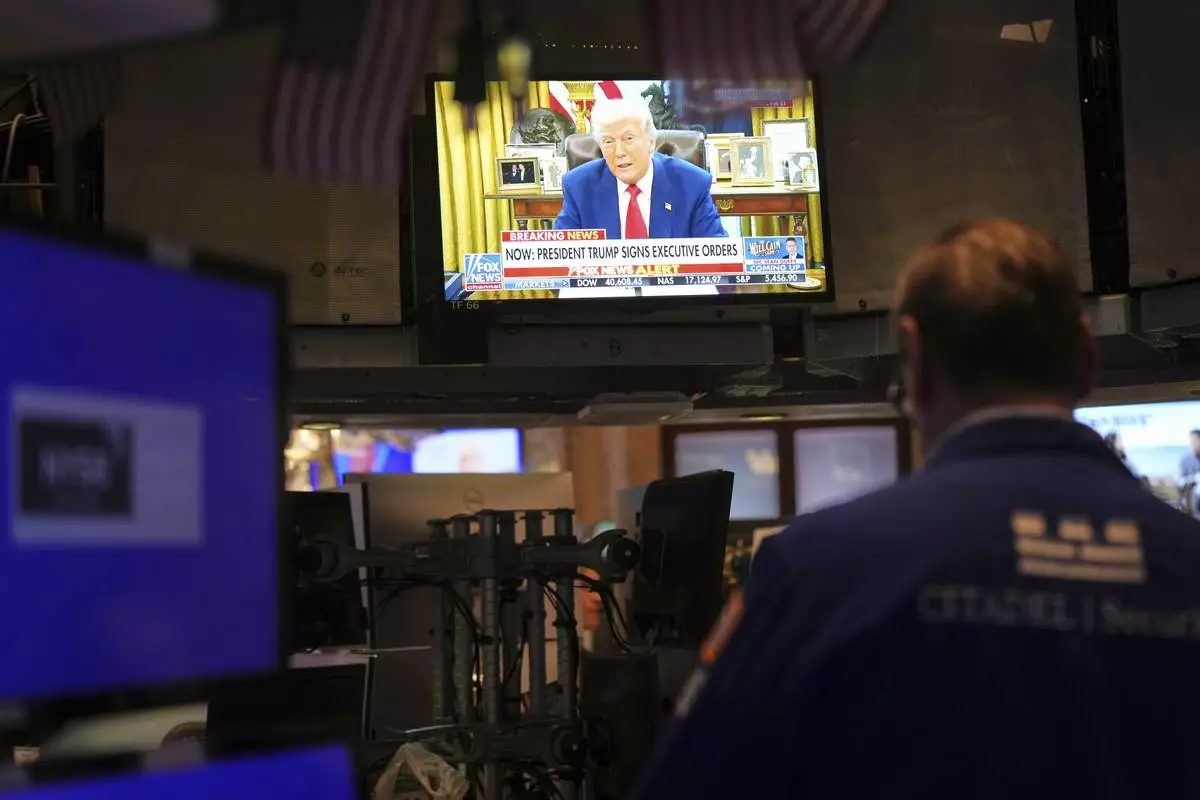
President Donald Trump is displayed on a television on the floor at the New York Stock Exchange in New York, Wednesday, April 9, 2025. (AP Photo/Seth Wenig)
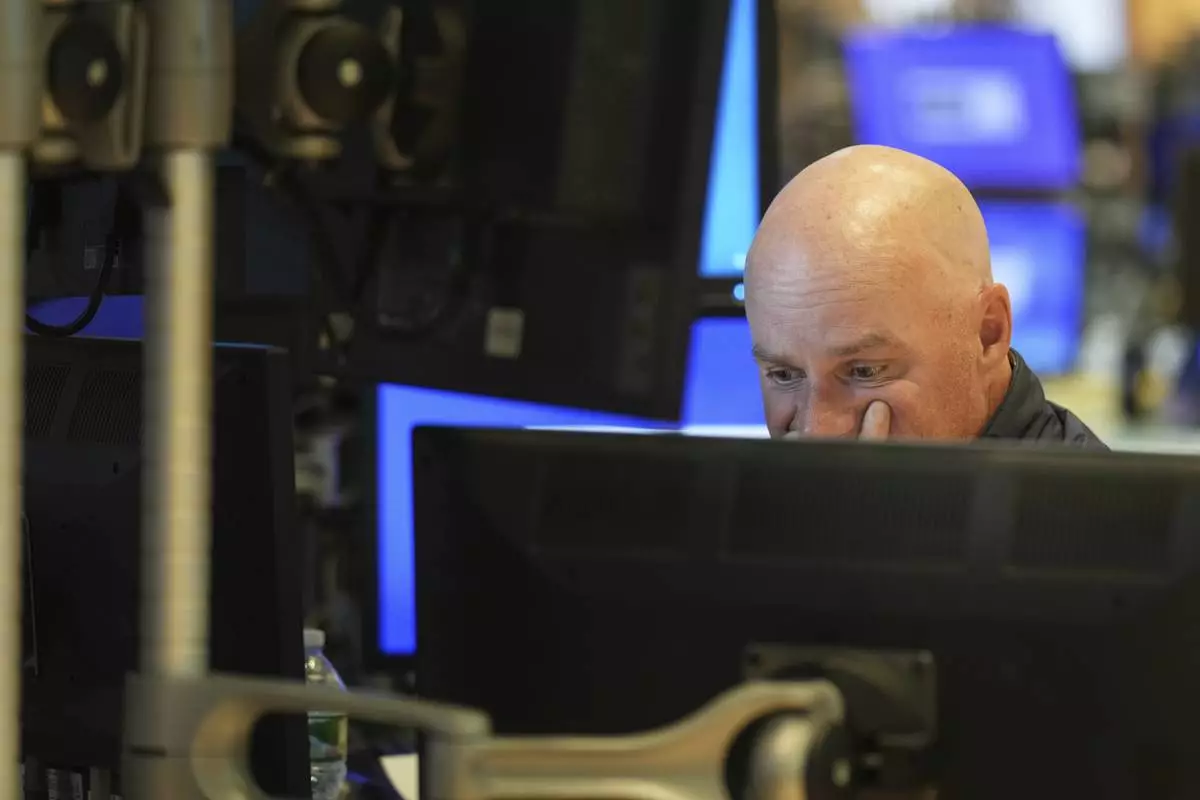
A traders works on the floor at the New York Stock Exchange in New York, Wednesday, April 9, 2025. (AP Photo/Seth Wenig)
















![U.S. citizens who immigrated from Venezuela between 16 and 30 years ago play dominos outside El Arepazo, a restaurant that is a hub of the largest Venezuelan community in the U.S., in Doral, Fla., Wednesday, April 2, 2025. Many of the friends, including Cesar Mena, at right, voted for President Donald Trump and continue to support him. "I have family and friends on TPS [Temporary Protected Status] and I feel bad for them. But it's a temporary situation, and you need to resolve the problem." (AP Photo/Rebecca Blackwell)](https://image.bastillepost.com/1200x/wp-content/uploads/global/2025/04/c69423facf44b6b804e1e5ae7a5cc99f_Immigration_Temporary_Status_Venezuelans_79573.jpg.webp)


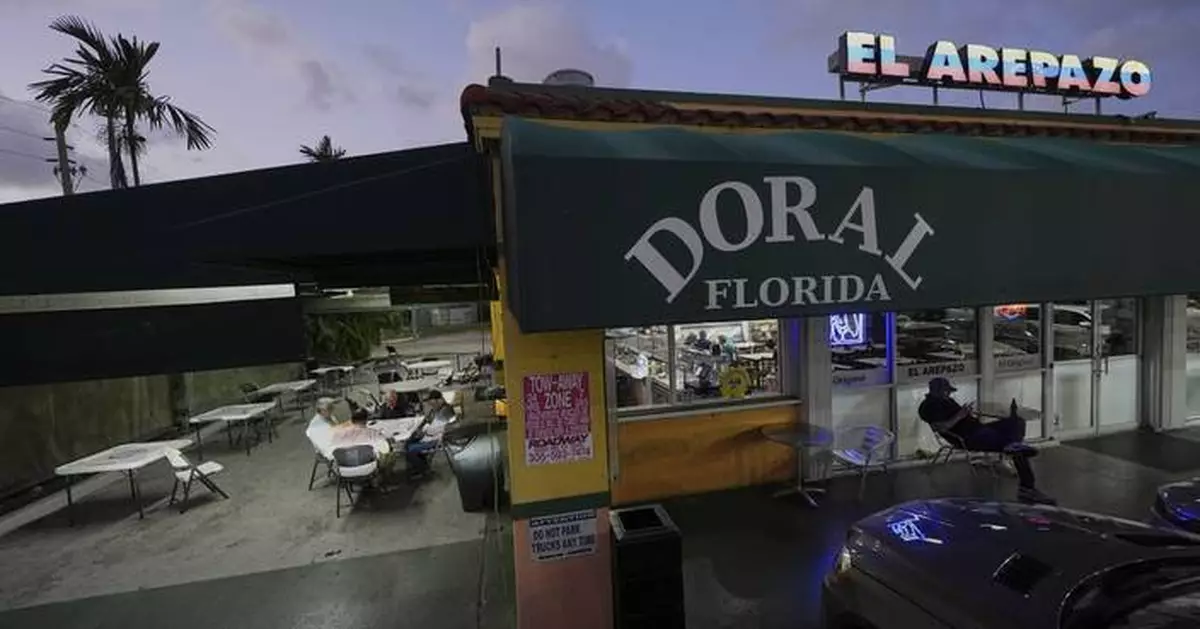
















![U.S. citizens who immigrated from Venezuela between 16 and 30 years ago play dominos outside El Arepazo, a restaurant that is a hub of the largest Venezuelan community in the U.S., in Doral, Fla., Wednesday, April 2, 2025. Many of the friends, including Cesar Mena, at right, voted for President Donald Trump and continue to support him. "I have family and friends on TPS [Temporary Protected Status] and I feel bad for them. But it's a temporary situation, and you need to resolve the problem." (AP Photo/Rebecca Blackwell)](https://image.bastillepost.com/644x392/wp-content/uploads/global/2025/04/c69423facf44b6b804e1e5ae7a5cc99f_Immigration_Temporary_Status_Venezuelans_79573.jpg.webp)









